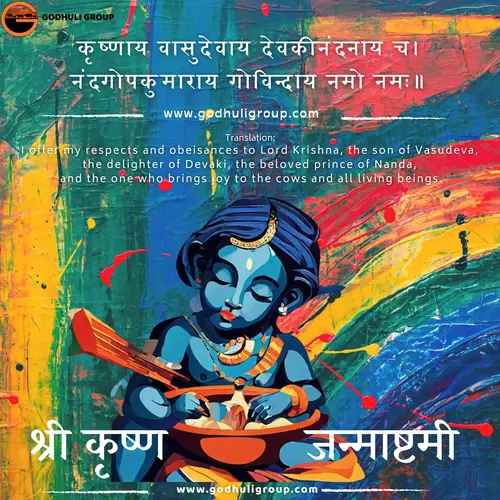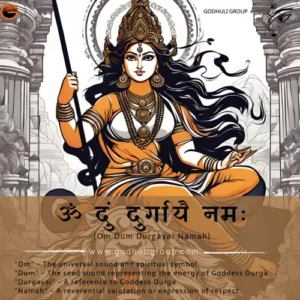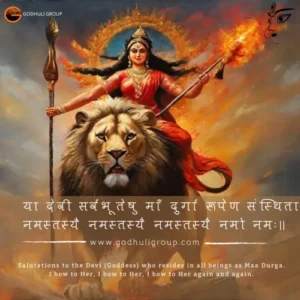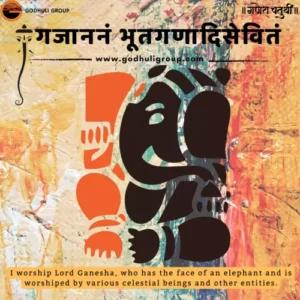The term “Janmashtami” is a mixture of two Sanskrit terms, “Janma” and “Ashtami,” each with its own meaning. Janmashtami 2023 is a Hindu holiday commemorating the birth of Lord Krishna, a renowned Hindu god. Let’s dig deeper into the origins and meanings of this name by delving into its components and cultural background in over 800 words.
Real Meaning Of Krishna Janmashtami 2023

Meaning of Janma (जन्म)
1. Janma (Nature): “Janma” comes from the Sanskrit root “Jan,” which meaning “to be born” or “birth.” “Janma” especially refers to the birth of Lord Krishna in the context of Janmashtami. Lord Krishna is revered as the seventh avatar (incarnation) of Lord Vishnu, one of Hinduism’s most important deities. The festival of Janmashtami commemorates Krishna’s glorious birth.
The concept of birth is extremely important in Hindu philosophy and spirituality. It symbolizes the cyclical nature of life, death, and rebirth, which is central to the belief in reincarnation.
According to Hindu belief, the soul continues through countless cycles of birth and rebirth until it achieves spiritual liberation (moksha) from the cycle of samsara (birth, death, and rebirth). Thus, commemorating the birth of a holy being, such as Lord Krishna, represents the divine descending into the mortal world, bringing spiritual direction and the potential of liberation to believers.
Meaning of Ashtami
2. Ashtami (Eighth Day): The second component of the name, “Ashtami,” alludes to the eighth day of the Hindu lunar calendar. Days in the Hindu calendar are divided into two halves: the bright half (Shukla Paksha) and the dark half (Krishna Paksha) of the lunar month. Ashtami, the eighth day, is a major day in both halves.
In the context of Janmashtami, “Ashtami” refers to the eighth day of the Krishna Paksha in the month of Bhadrapada. This is supposed to be Lord Krishna’s birthday, and it is celebrated with tremendous zeal and devotion by Hindus all over the world. The choice of this fortunate day for Lord Krishna’s birth ceremony emphasizes the heavenly significance linked to it.
The Importance of the Number 8 in Hinduism: In Hinduism, the number eight has significant significance and is frequently associated with divine characteristics and cosmic principles. Here are some of the significances of the number eight:
What is the Importance of Number 8 in Numerology
- Astrological Significance: There are eight prominent celestial objects in Hindu astrology known as “Ashtagrahas,” which include the Sun, Moon, Mars, Mercury, Jupiter, Venus, Saturn, and the ascending and descending lunar nodes (Rahu and Ketu). These celestial bodies are important in astrological calculations because their locations are thought to influence human life and fate.
- Eight Directions: According to Hindu cosmology, there are eight major directions, including four cardinal directions (north, south, east, and west) and four ordinal directions (northeast, northwest, southeast, and southwest). These directions are linked to many deities and cosmic energy and are used in rituals and devotion.
- Eightfold Path: The Eightfold Path is a notion in Buddhism, which shares cultural and philosophical roots with Hinduism, that serves as a guide to living a virtuous and full life, ultimately leading to enlightenment (nirvana).
- Ashtalakshmi: In Hinduism, there is a notion known as “Ashtalakshmi,” which refers to the eight forms of the goddess Lakshmi, the goddess of wealth and prosperity. These forms reflect diverse facets of riches and abundance, emphasizing the significance of balance and well-being in all parts of life.
- Vedic Octads: The number eight is considered exceedingly auspicious in Vedic mathematics. The mathematical significance of eight and its involvement in many mathematical processes was recognized by ancient Indian mathematicians and academics.
Given these ties, celebrating Lord Krishna’s birth on Janmashtami on the eighth day (Ashtami) emphasizes the divine aspect of this event and its alignment with cosmic laws.
Janmashtami Festivities: Janmashtami is celebrated with zeal and dedication throughout India and by Hindus worldwide. On the eve of Janmashtami, the day when Lord Krishna is said to have been born, the celebrations traditionally begin with fasting, prayer, and devotional chanting.
Devotees frequently keep vigil all night, engaging in spiritual activities such as singing bhajans (devotional songs), reading and reciting passages from the Bhagavad Gita (a sacred Hindu text in which Lord Krishna imparts spiritual wisdom to Arjuna), and narrating stories from Lord Krishna’s life, particularly his childhood and youthful adventures.
Importance of Dahi Handi in Janmanshtami?
The Dahi Handi celebration is one of the most prominent and greatly awaited events of Janmashtami. A clay pot filled with yoghurt, butter, or other delights is held at a substantial height in this ritual. To reach and destroy the pot, groups of young men, called as “Govindas,” create human pyramids, symbolising Lord Krishna’s love for butter and his mischievous disposition as a youngster.
Temples dedicated to Lord Krishna are lavishly decorated, and idols or pictures of Lord Krishna as a child are put in cradles, symbolising his birth. Devotees give special prayers, perform aarti (lamp-offering ceremonies), and distribute prasad (blessed food offerings) to the assembled devotees.
Janmashtami is also a time for colorful and lively processions, especially in regions associated with Lord Krishna’s life, such as Mathura (his birthplace) and Vrindavan (his boyhood home). These processions feature artistically decorated chariots carrying Lord Krishna idols, and followers join enthusiastically.
Conclusion
In conclusion, the name “Janmashtami” captures the essence of the festival: the celebration of Lord Krishna’s divine birth on the eighth day (Ashtami) of the Krishna Paksha in the month of Bhadrapada, marked by profound devotion, spiritual significance, and a connection to cosmic principles associated with the number eight in Hinduism. People of various ages and backgrounds gather to honor Lord Krishna, seek spiritual direction, and celebrate the timeless wisdom and love he epitomizes in Hindu mythology and philosophy. Janmashtami commemorates the divine presence in the midst of human life and the eternal quest for spiritual enlightenment.
Read More :
Celebrating Raksha Bandhan 2023
Meaning Of “असतो मा सद्गमय, तमसो मा ज्योतिर्गमय, मृत्योर्मा अमृतं गमय”
Onam – The Story Behind Onam Celebration



